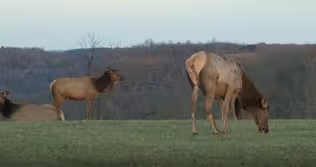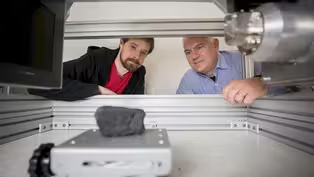
Poets of Kentucky: Belle Townsend
Clip: Season 30 Episode 16 | 6m 29sVideo has Closed Captions
Belle Townsend is a writer who is documenting diverse rural voices.
Belle Townsend is a writer, organizer, and journalist who founded Backwoods Literary Press, a non-profit press project that aims to platform and document diverse rural voices. Now based out of Louisville, Belle has proven to be a strong voice in helping the community and promoting the rich artistic culture of Kentucky.
Problems playing video? | Closed Captioning Feedback
Problems playing video? | Closed Captioning Feedback
Kentucky Life is a local public television program presented by KET
You give every Kentuckian the opportunity to explore new ideas and new worlds through KET. Visit the Kentucky Life website.

Poets of Kentucky: Belle Townsend
Clip: Season 30 Episode 16 | 6m 29sVideo has Closed Captions
Belle Townsend is a writer, organizer, and journalist who founded Backwoods Literary Press, a non-profit press project that aims to platform and document diverse rural voices. Now based out of Louisville, Belle has proven to be a strong voice in helping the community and promoting the rich artistic culture of Kentucky.
Problems playing video? | Closed Captioning Feedback
How to Watch Kentucky Life
Kentucky Life is available to stream on pbs.org and the free PBS App, available on iPhone, Apple TV, Android TV, Android smartphones, Amazon Fire TV, Amazon Fire Tablet, Roku, Samsung Smart TV, and Vizio.
Providing Support for PBS.org
Learn Moreabout PBS online sponsorshipTo conclude our Poets of Kentucky series here on Kentucky Life, we're going to focus on an up-and-coming poet from western Kentucky.
Belle Townsend is a writer, organizer, and journalist, who founded Backwoods Literary Press, a nonprofit press project that aims to platform and document diverse rural voices.
Now based out of Louisville, Belle has proven to be a strong voice in helping the community and promoting the rich artistic culture of Kentucky.
I owe everything to the good country women before me who worked on the farm in hosiery manufacturing, in salons, in classrooms, in the home.
The men I knew in my family were nuanced, loving and hard working with hard calloused hands.
The women in my family not only survived the conditions of rural life but also through men leaving or men staying.
This is for Maggie Jane, Blanche Juanita, Linda Sue and Michelle Deneen, who all did what they could to create through surviving so that I could create through living.
Last names denote ownership of property but they are also what gets passed down, what gets remembered, what gets documented.
Let this poem hold space for those who have made space for me.
Let this poem remember and document so that my people will not be forgotten.
One of the up-and-coming Kentucky writers that I've been hearing about is Belle Townsend.
I know Belle's writing mostly through journalism.
I love the way that they're pursuing writing and especially the way Belle is expanding notions of what a Kentucky writer is and must be, pushing the boundaries on all those things.
I think you know artists should always be pushing boundaries in every way they can.
My name is Belle Townsend.
I'm from Robards, Kentucky, in Henderson County.
I went to Henderson County High School.
I left Kentucky to go to Boston University to study political science.
As soon as I graduated, I brought my butt right back to Kentucky and I've written three poetry books since then.
I started writing just classically in school as it was expected of me in different assignments or whatever and at a certain age, I think I was about 14, I started writing poetry.
I do try to write about things from my perspective in a vulnerable way because I'm the subject matter that I know best but I also try to write about the family life and the culture that I grew up in because rural life is so often rewritten or just completely discarded.
I will say that I thought that I had to leave Kentucky in order to be myself as a queer person and after I left I realized that I could not be myself without Kentucky.
The way that we talk to each other and the way that we care for each other as community members in rural Kentucky, across Kentucky, it's so special and I kind of recognized it while I was here but I sure didn't recognize it enough.
And so, it was after leaving that I really realized how much Kentucky and the culture of Kentucky's people really impacted me.
As a writer, we have to be very introspective, and we have to know what we're saying and why we're saying it.
So, I had to deconstruct a lot of perspectives that I had, that I had learned from my family, and I also had to learn to lean into the good things that I learned from my family.
And so, it was through being able to learn what I really and truly believe, and not just what I was taught, that I was able to find my voice in writing.
But in that, also, I have such a gratitude for the people that came before me, because I would not be able to be doing what I do if it were not for them and for their sacrifices.
Canary in the Coal Mine.
My daddy built our house with his hands and his mind and years after our house was built he nonchalantly told me about the huge hole in the floor of the house he grew up in.
He told me about how him and his siblings would play games to see who could dance around it and not fall through the cracks.
My daddy worked in the coal mines in the summer to put himself through architecture school.
My daddy told me about how the money was good enough, how cartridge was too hard and how all he wanted to do was stay in the mines.
The men he worked with caught wind of this, took his clothes and jumped him.
They told him get out while you still can.
The men in my daddy's lineage were taken by the rich man's wars, by the rich man's opioid epidemic and by the rich man's mines.
My daddy listened to his father and the miners he worked with and he had more of himself to give me because of it.
What I did not tell you is that my daddy is a talented artist.
He constantly told me that I could be anything I wanted to be.
I knew that he wanted to be an artist and I know though that he wanted me to be an artist.
Here I am daddy.
Here we are daddy.
Did you know that miners used to carry canaries down into the coal mine tunnels as they navigated?
The dangerous gases would kill the canaries, alerting the miners that it was time to go.
This is how miners protected themselves and knew when to leave.
Kurt Vonnegut said something about artists being the canaries and the coal mines, about artists gauging and feeling for the greater good for those to come.
My daddy wanted to be an artist and even if he spends his long days in an office instead of in a studio, I want him to know that I can navigate, feel, engage my way through this life because he breathed this world in before I did.
I am who I am because my daddy told me over and over again, “I just want you to be yourself and share it with the world.
I'll love you no matter who you are.” I am who I am because my daddy hand laid every tile and board to make sure that I would not fall through the cracks.
█ █ █ █
Jenny Wiley: A Story of Resilience
Video has Closed Captions
Clip: S30 Ep16 | 6m 59s | Jenny Wiley, the frontier woman who became a legend in Kentucky history. (6m 59s)
Video has Closed Captions
Clip: S30 Ep16 | 9m 7s | A professor at the University of Kentucky used AI to digitally unwrap ancient scrolls. (9m 7s)
Providing Support for PBS.org
Learn Moreabout PBS online sponsorshipSupport for PBS provided by:
Kentucky Life is a local public television program presented by KET
You give every Kentuckian the opportunity to explore new ideas and new worlds through KET. Visit the Kentucky Life website.















